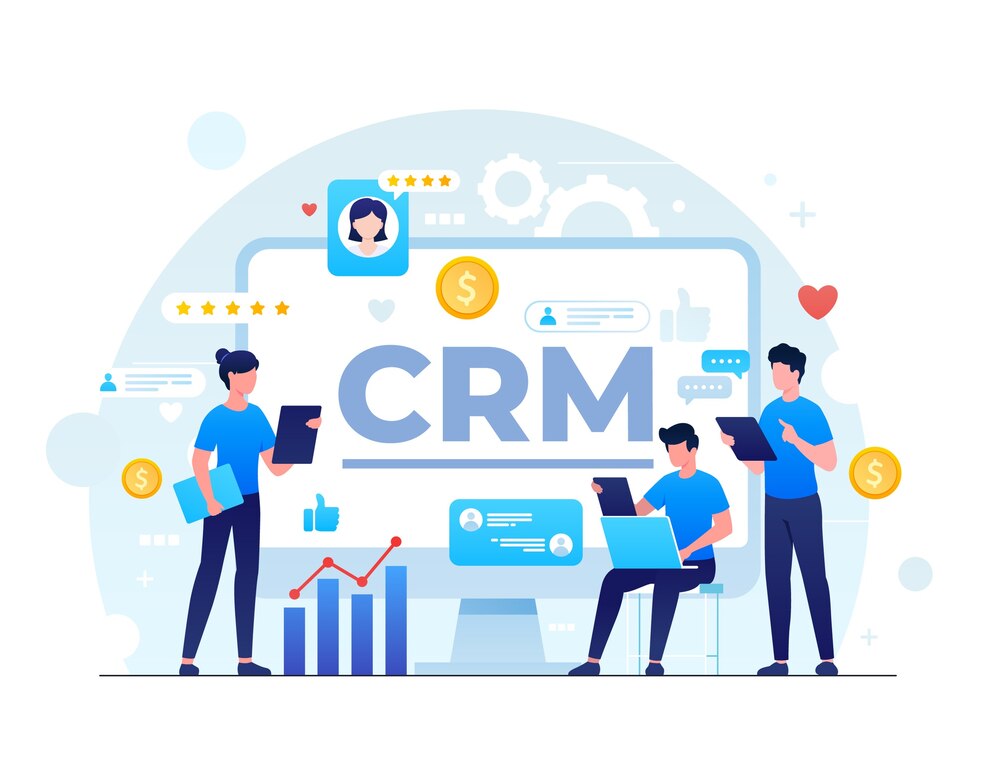Custom CRM Software Development: A Worthy Upgrade In The Long Run
CRM (Customer Relationship Management) software is widely considered to be a must-have for many enterprises, ranging from SME to Corporate Level. Such solutions enable the storage, access, and management of critical consumer information that you can access on the fly and shorten the amount of work later on. And just like a tale that is old as time, the real question that many people, many business owners tend to ask is: “Do I really need to build/outsource a custom CRM or can I just use existing CRM by 3rd Party Provider?”
Follow us as we will discover the many advantages and also disadvantages of both options and learn how a Custom CRM Development in the future could potentially accelerate your business to the next level.
1. A Quick Look at CRM Statistics

Customer Relationship Management
- By 2025, the CRM market is estimated to generate more than $80 billion in sales.
- According to Forester, employing a mobile CRM increased team productivity by 50%.
- Only 12% of organizations have cloud-based CRM in 2008. This figure has now risen to 87 percent.
The stats here are quite impressive. So, how could you adopt a CRM system?
| Out-of-the-box-solution | You can use a CRM system provided by a SaaS provider. However, because this software is designed for the mass market rather than a single organization, it is unlikely to meet all business requirements. |
|
Customize a CRM software |
Customization entails adding functionality to a pre-built system that you require. However, it can be costly and time-consuming. An experienced Salesforce developer, for example, makes roughly $117k per year. In addition, you must pay Salesforce at least $25 per month per user. |
| Development of a custom CRM system | You can employ bespoke CRM developers to create a solution that meets your needs and objectives. This option can be somewhat costly, but there is no additional charge for CRM. |
2. So, When is Custom CRM Development the Right Choice?
If you can’t find a ready-to-use CRM solution that meets your needs, you should go custom. And there are a number of reasons to why you should start thinking about custom CRM development. However, it’s still better to research pre-packaged CRMs like Oracle and Salesforce before investing in custom CRM software development.
| Customized for Your Business Needs |
The majority of CRM systems are designed for the mass market. As a result, they are unable to meet your needs and expectations. If your company requires some unique features, you should consider starting from scratch. Custom-made chatbots, for example, can provide more personalized support to your customers. |
| Unique Design |
Pre-packaged CRMs usually come with a variety of design themes, button layouts, tab layouts, and other features. Each business has its own process, and pre-built CRM systems have a standardized (sometimes complex owing to a high number of features) design with minimal customization choices. As a result, you can devote a significant amount of time and money on staff training. |
| Various Integrations |
If you require a large number of integrations, you should investigate whether a ready-made CRM can accommodate them. There are integrations for emailing, social media, and messengers, for example. Custom CRM app development is generally a preferable alternative if you want to remain working with all of the services you’re used to. |
| Cloud Architecture |
It is not to difficult to create a cloud-based solution that may be accessed at any time. Because all of the data is saved in the cloud, your team may access it at any time and from anywhere in the world. This is extremely more forgiving for peple that are working remotely due to Covid-19 |
3. Custom CRM Development: Types of CRM Systems
When it comes to custom CRM application development, platforms should be considered. CRM solutions are available for desktop, online, and mobile devices.
- For Desktop: With the help of C++ or C# and Swift or Objective-C, custom CRM developers can construct desktop solutions for macOS and Windows.
- For Web & Cloud Custom CRM: Software engineers frequently employ Angular, Bootstrap, JavaScript, and Node.js for the web version.
- For Mobile: Flutter-powered native apps for iOS and Android, as well as cross-platform mobile solutions.
CRM development necessitates a thorough understanding of existing CRM kinds. On the market, there are three main types: operational, collaborative, and analytical.
| 1. Operational CRM |
A number of features are available for marketing, sales, and customer service departments. Lead and contact management, sales pipeline, and helpdesk are the most common features. Existing solutions: Hubspot, Salesforce |
| 2. Collaborative or strategic CRM |
Customer interactions with your company are the emphasis of these CRM systems. They tend to analyze customer behavior and provide insight into client interactions. Sales and purchase histories, marketing choices, and tech support encounters are just a few examples. Existing solutions: Pipedrive, Copper |
| 3. Analytical CRM |
CRM solutions like this assist businesses in analyzing client data. Customer preferences, channels, points of contact, interests, and other factors can all be considered. You can get insights, statistics, and analytics data from the system. Existing solutions: Zoho Analytics, Salesforce Wave Analytics |
4. How to Build a Flawless Custom CRM Development Without Fail!
Many mid-size businesses and organizations appear to find custom CRM software development to be an excellent alternative. Out-of-the-box software cannot deliver the exact functionality that each organization requires to operate efficiently. As a result, CRM development can help you save a lot of money in the long run. Let’s have a look at the stages involved in creating a CRM application.
Step 01. Do Your Research
You must communicate your requirements and business goals to a development team in order to obtain a useful product. Before beginning CRM development, it’s a good idea to talk to employees in the marketing and sales departments to figure out what problems they’re having and how a CRM system can help them solve them.
| Business goals |
You can better your results by prioritizing your needs. Your CRM system, for example, can control data flows and automate common operations for your personnel. The style, CRM type, quantity of features, and even tech stack are all influenced by your business goals. |
| Security |
You should think about security depending on the type of data in your CRM. There are also industry-specific and general standards. For example, additional certificates such as HIPAA and GDPR are required in the healthcare industry. |
| Data Regulations |
Information storage and management necessitates the application of a slew of norms and regulations. Keep in mind that they may vary based on your location. These restrictions tend to restrict your capacity to acquire specific client data (address, relationship status, and more). It’s a good idea to familiarize yourself with the PCI DSS, GDPR, and PIPEDA regulations ahead of time. |
Step 02. Define Key Features
A CRM system might have a wide range of capabilities. When you choose bespoke CRM development, you can choose from a variety of unique features to match business needs. To keep this part brief and sweet, I’ve simply covered the essential aspects of a CRM system.
| Email Marketing & Newsletter |
For marketing objectives, it is preferable to integrate the email system. Every customer’s communication can be tracked. Because managers get a large number of emails each day, the email marketing feature is particularly beneficial. CRM has the ability to send emails automatically. You can also include an option to start an email sequence. If a consumer opens the first letter, for example, the system will send the following one. |
|
File Sharing |
CRM development allows you to create a simple system for storing and sharing documents. You can give access to various departments or even employees because all of the documents are in one place. The system can also keep track of all document interactions. As a result, you can see who edited the document. |
| Sales Process |
A simple sales tracking system is required by the CRM system so that you can view the status of each order. It allows sales managers to know where each lead is in the sales process (new leads, contact made, qualified, and so on). This function also allows you to identify the point at which your business begins to lose consumers. |
| Reports |
Customer analysis is one of the most useful components of a CRM system. Each client’s information is collected, including purchase history, address, and marketing choices. CRM creates customised offers for each consumer based on the information gathered. |
| Chatbots |
When considering CRM development, consider business process automation. Chatbots are ideal for customer service because they are available 24 hours a day, seven days a week. They can also automate a variety of tasks:
|
Step 03. Think of a Desirable Budget that fits your Business
It’s difficult to estimate the cost of custom CRM Development because it can range from $25,000 to $350,000. (or even go up). Everything is contingent on the intricacy of your CRM and your requirements.
It’s best to consult with the development team to determine the CRM development cost. To receive a more specific estimate, you should clarify your business goals to the IT specialists.
As you can see, the cost of CRM development varies. Let’s look at the main price influences.
| The scope of the project | The higher the expense, the more sophisticated features you add. Not to mention a greater certification, custom CRM developers require extra time to implement vital functionality. |
|
The location of the developers |
The cost of development is determined by the team’s location. Companies in North America, for example, charge some of the highest rates in the world while Asian software development companies on the other hand, have the lowest rates, but the quality of their products and customer service are sometimes questioned, especially for BPO that are from India. |
| Level of seniority | According to their job experience, custom CRM developers are typically divided into three categories: junior, middle, and senior. It’s preferable to choose more experienced professionals – middle or senior developers — when it comes to CRM systems. |
Step 04. Find a Team
Because CRM is such a complex system with so many integrations, you should hire a team of custom CRM developers. There are three common methods for hiring software engineers:
- Collaborate with independent developers.
- Form an internal team.
- Locate a reputable outsourcing firm.
| [icon name=”exclamation-triangle” prefix=”fas”] Freelance Developers | These days, freelancing is getting increasingly popular. CRM development, on the other hand, necessitates long-term collaboration, whereas freelancers are prone to switching jobs and missing deadlines. |
|
[icon name=”exclamation-triangle” prefix=”fas”] In House Development Team |
You can control the development process and maintain smooth communication by hiring an in-house team. However, because there are numerous additional expenses such as rent, hardware, software, taxes, and more, this option is the most expensive. |
| [icon name=”star” prefix=”fas”] Outsourcing Tech Partner & Dedicated Team | Outsourced development is becoming a popular choice for many businesses due to the low costs and great quality of the final output. For custom CRM application development, you can also employ a professional development team. |
Looking To Find A Trusted Tech Partner?
Tech Consulting, End-to-End Product Development, Cloud & DevOps Service! Since 2009, Savvycom has been harnessing digital technologies for the benefit of businesses, mid and large enterprises, and startups across the variety of industries. We can help you to build high-quality software solutions and products as well as deliver a wide range of related professional services.
Savvycom is right where you need. Contact us now for further consultation:
- Phone: +84 24 3202 9222
- Hotline: +1 408 663 8600 (US); +612 8006 1349 (AUS); +84 32 675 2886 (VN)
- Email: [email protected]


